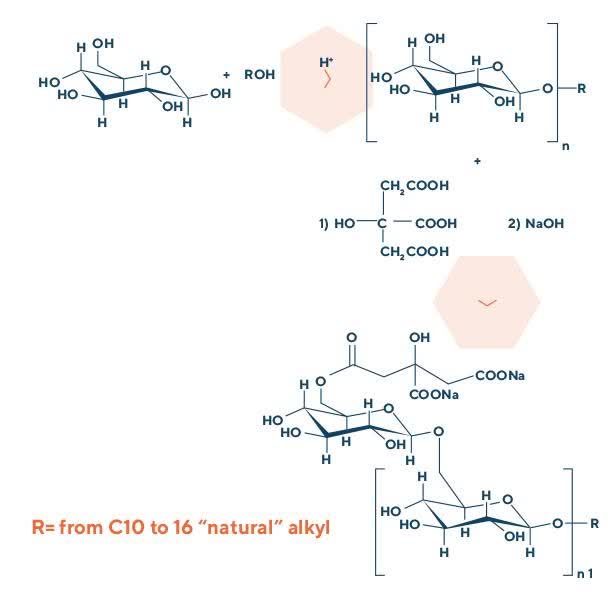Alkylpolyglucoside Esters
Chemistry

Alkylpolyglucoside Esters is an innovative family of carboxylates surfactants, that has been exclusively designed and developed by our R&D team with the ambition to create modern highly sustainable surfactant.
The process cycle does not involve any organic solvents and has been optimized in order to minimize waste generation.
Alkylpolyglucoside esters are obtained in a two-step process. The first step is the synthesis of the alkylpolyglucoside through the acid catalyzed reaction between natural vegetable fatty alcohol and starch derived glucose.

This is an industrial example of the classical Fisher Glycosidation, i.e. the etherification of the glucose hydroxyl group link to the anomeric position. The second step is the esterification of the alkylpolyglucoside with natural fermentation derived citric or tartaric acids.
In this way we have obtained two surfactants completely derived from renewable raw materials as evidenced by their conformity to COSMOS and Natrue cosmetics standard.
In addition they are manufactured and certified according to the RSPO's Mass Balance supply chain model.
Outstanding characteristics

Besides being completely derived from renewable raw materials, Alkylpolyglucoside esters are characterized by an extreme mildness to both the skin and mucous membranes and are able to reduce the irritating power of conventional anionic surfactants like laurylsulfate or laurylethersulfate.
- Excellent mildness for skin and mucous membranes
- Completely derived from renewable material
- Ready biodegradable
- Low aquatic toxicity
- Ethylene Oxide, dioxane and nitrosamine free
These properties make them suitable for modern sustainable Personal Care formulations.
As a result of our continuous focus on sustainability, we recently expanded our portfolio of alkylpolyglucoside esters with the introduction of a new version of the citric derivative with a very low water content; this version perfectly fits with the new trend of low water personal care formulations.
